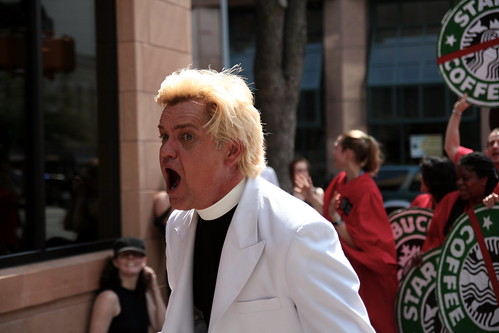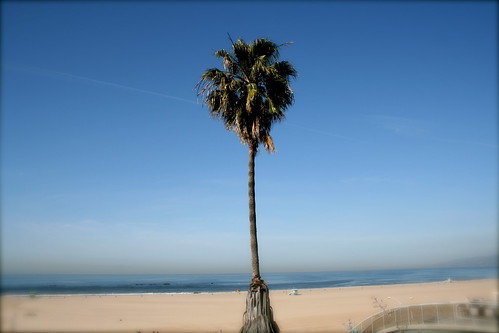
Reverend Billy preaches against Starbucks in Austin, TX.
Reverend Billy came to the chain-ridden streets of Silver Spring to minister for our sins. What did we do wrong? Americans shop too much, according to the Reverend, with our dreams dictated by major brands and our lives enslaved by credit card debt.
With this type of message, you would think that his movie, “What Would Jesus Buy” would be a humorless polemic. But what distinguishes the Reverend from the whole crop of latter-day alarmists (for example, the food police) is the humor and humanity he brings to his evangelical message.
I first encountered the Reverend on the streets of Austin during SXSW. He and his joyous band led a gospel-style procession up Congress Avenue, singing out to everyone, “Stop shopping! Stop shopping!” Like the Pied Piper, he soon had a delighted throng following him, for the choir was truly rocking and the lyrics were hilarious indictments of our own materialism. He led a crowd up to a Starbucks and preached against the sins of this ubiquitous company, and for all of us to make better choices with our dollars.
This humor and appeal to our better nature is on display in the new documentary, “What Would Jesus Buy.” This film, which screened at SilverDocs, follows the Reverend and his choir around the country at the height of Xmas shopping madness. Produced by Morgan Spurlock, it’s a funny and occasionally horrific look at the excesses of 21st century America. We have too much stuff and spend more than we have to buy the latest products pitched to us.
Where the doc comes alive is when we see Reverend Billy and his wife, Savitri D, struggle with their mission. Are they really making a difference? The Reverend answers affirmatively, if they can just change one life. And they do, by blessing an infant outside a Target – a really touching moment.
This sets up the final confrontation with the forces of the “shopacolypse” as Reverend Billy goes into the belly of the Beast (or Mouse) to spread his good news.
The packed house at SilverDocs loved it, especially when the Reverend and the choir appeared in the wings and began to sing a couple of new songs. They’re trying to get distribution for the movie.
Nobody likes being preached to, whether it’s religion or politics. But Reverend Billy has managed to communicate his message through humor and satire. And it’s a message that stays with you because the Reverend doesn’t try to make us feel guilty, he tries to make us good.

